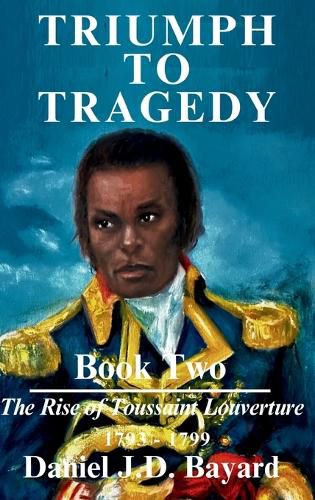Readings Newsletter
Become a Readings Member to make your shopping experience even easier.
Sign in or sign up for free!
You’re not far away from qualifying for FREE standard shipping within Australia
You’ve qualified for FREE standard shipping within Australia
The cart is loading…






This title is printed to order. This book may have been self-published. If so, we cannot guarantee the quality of the content. In the main most books will have gone through the editing process however some may not. We therefore suggest that you be aware of this before ordering this book. If in doubt check either the author or publisher’s details as we are unable to accept any returns unless they are faulty. Please contact us if you have any questions.
Toussaint Louverture is a Haitian hero-considered one of the founding fathers of the nation. To understand who he was, we must begin the story with his father in West Africa in the 1720s. A king had just passed and two brothers were challenging to succeed the throne over the Allada people. The younger brother, named Gaou Guinou-Toussaint's father-went to war against his older brother Hussar for the rightful accession to power, but in the end was captured and sold as a slave bound for the French West Indies.
Toussaint was the first born son of Gaou Guinou and worked in the manor house at the Plantation Breda in French Saint Domingue. Toussaint developed great skills in natural medicine, eventually becoming a veterinarian, a superb equestrian and horse trainer.
His overseer, Bayon de Libertat, took a liking to the boy and admired his pride and guts when he would stand firm against members of the Petits-Blancs (white commoners) who worked on the plantation as hired help. By his early thirties Toussaint was emancipated by Libertat. At the start of the Haitian revolution, Toussaint was nearly 50 years old and initially allied with the Spaniards of neighboring Santo Domingo against the French. Toussaint demonstrated strength for military leadership, strategy, logistical operations and fighting capabilities. He trained and mobilized a lethal fighting force encompassing a highly trained and effective honor guard. And won many battles against the French Colonial Army.
Toussaint switched his allegiance to the French when France officially abolished slavery in 1794 and went on to defeat the Spanish Colonial Army on their behalf.
Louverture gradually established military and political control over the island and used his influence to gain dominance over his rivals. Throughout his years in power, Toussaint worked to balance the economy and security of Saint-Domingue as he restored the plantation system utilizing paid rather than slave labor, negotiated trade agreements with the United Kingdom and the United States, and maintained a large and well-trained army.
This is the story of his Triumph prior to his eventual fall into Tragedy.
$9.00 standard shipping within Australia
FREE standard shipping within Australia for orders over $100.00
Express & International shipping calculated at checkout
This title is printed to order. This book may have been self-published. If so, we cannot guarantee the quality of the content. In the main most books will have gone through the editing process however some may not. We therefore suggest that you be aware of this before ordering this book. If in doubt check either the author or publisher’s details as we are unable to accept any returns unless they are faulty. Please contact us if you have any questions.
Toussaint Louverture is a Haitian hero-considered one of the founding fathers of the nation. To understand who he was, we must begin the story with his father in West Africa in the 1720s. A king had just passed and two brothers were challenging to succeed the throne over the Allada people. The younger brother, named Gaou Guinou-Toussaint's father-went to war against his older brother Hussar for the rightful accession to power, but in the end was captured and sold as a slave bound for the French West Indies.
Toussaint was the first born son of Gaou Guinou and worked in the manor house at the Plantation Breda in French Saint Domingue. Toussaint developed great skills in natural medicine, eventually becoming a veterinarian, a superb equestrian and horse trainer.
His overseer, Bayon de Libertat, took a liking to the boy and admired his pride and guts when he would stand firm against members of the Petits-Blancs (white commoners) who worked on the plantation as hired help. By his early thirties Toussaint was emancipated by Libertat. At the start of the Haitian revolution, Toussaint was nearly 50 years old and initially allied with the Spaniards of neighboring Santo Domingo against the French. Toussaint demonstrated strength for military leadership, strategy, logistical operations and fighting capabilities. He trained and mobilized a lethal fighting force encompassing a highly trained and effective honor guard. And won many battles against the French Colonial Army.
Toussaint switched his allegiance to the French when France officially abolished slavery in 1794 and went on to defeat the Spanish Colonial Army on their behalf.
Louverture gradually established military and political control over the island and used his influence to gain dominance over his rivals. Throughout his years in power, Toussaint worked to balance the economy and security of Saint-Domingue as he restored the plantation system utilizing paid rather than slave labor, negotiated trade agreements with the United Kingdom and the United States, and maintained a large and well-trained army.
This is the story of his Triumph prior to his eventual fall into Tragedy.